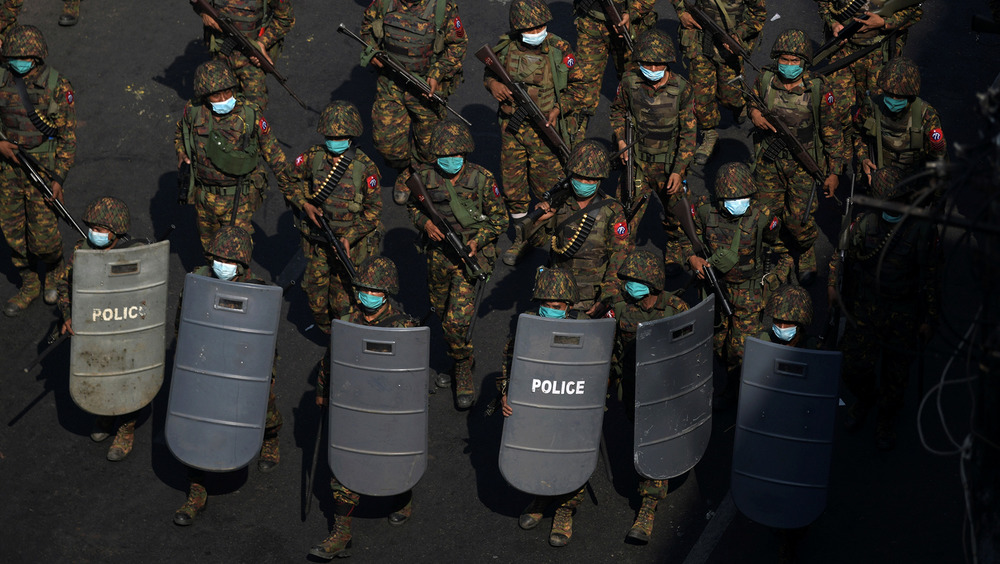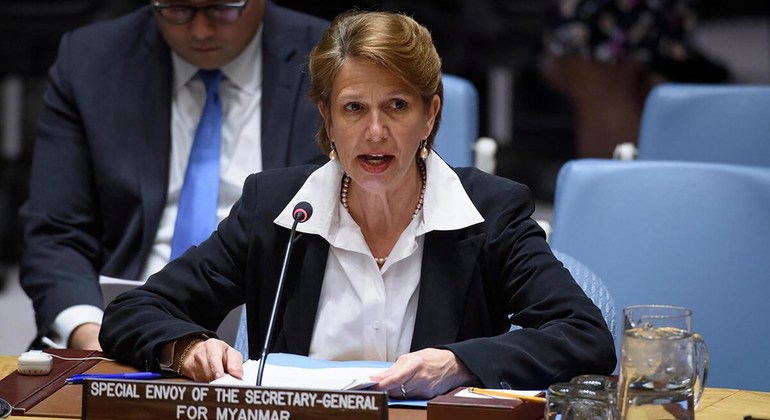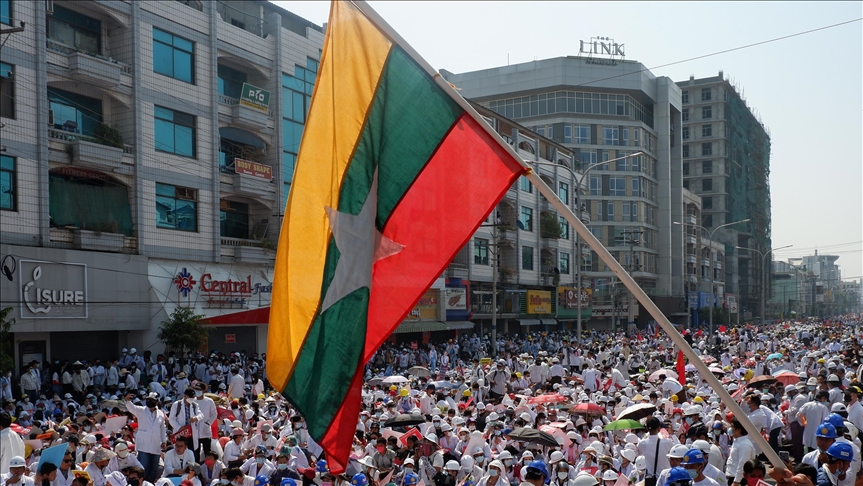|
|
“The military launched a coup against the government established by its people. I felt battered. Myanmar had just learned to fly, but the military broke its wings.” A college student in Myanmar expressed frustration in an interview with Yonhap News Agency on February 1, 2021. Myanmar dreamed of restoring democracy with the leadership of Aung San Suu Kyi last November. However, it fell into chaos again because of a military coup this February. What made Myanmar become the site of the longest civil war in the world?
Myanmar, from military autocracy to democracy
In order to understand Myanmar’s situation, it is important to know its history. Myanmar was under the control of Britain after 1885. Then in 1945 after World War Ⅱ as Japan was defeated, General Aung San, a leader of Myanmar then, visited Britain to request its independence. He made an agreement with leaders of the minority groups at Panglong on February 12, 1947, which led Myanmar to become an independent republic. The agreement guaranteed proper treatments and political participation of minorities and secured their autonomy. Genera Aung San achieved Myanmar’s independence with cooperation of the minorities and promised to discuss their autonomy and independence later, which was written in Article 6. Article 7 stated that all people in Myanmar should have equal rights and benefits as citizens, which meant the minority groups could have equal rights as the majority, Burma. However, Gen. Aung San was killed 5 months after the agreement and the military has oppressed the minorities since 1962 when it seized control.
Under the unstable political situation, Ne Win, a socialist leader mounted a military coup on March 2, 1962 and took power. The military began to revise the constitution and justify a military dictatorship and the coup. According to the revised constitution, the military nominated the military commander-in-chief by itself and the president and prime minister couldn’t command the military. Moreover, the military filled 25 percent of the seats in the legislature to block any reformation of the constitution. Ne Win invalidated all of the agreements with Western countries including the Panglong agreement, which led the minorities to be forcefully divided and be suppressed in case of protests. The people of the Rohingya minority, which had had a huge influence, were driven into Arakan and were deprived of citizenship.
During the long military dictatorship, civil societies in Myanmar lost almost all their power. After the first military coop, Ne Win nationalized the economy and made it self-sufficient under the socialist system. Myanmar ended up isolated from the world economy and the UN designated Myanmar as the poorest country in 1987. In September of the same year, the government declared several currency denominations worthless, wiping out the savings of many Burmese and college students opposed to the policy. Amid the complaint against the government, a massive antigovernment demonstration was held on August 8, 1988. The people of Myanmar called this movement for democracy the 8888 uprising. The Ne Win administration brutally subdued the protestors, mobilizing the army. Under these circumstances, about 3,000 were shot dead and 10,000 were missing. As a result of the uprising, Ne Win resigned and socialism was abolished, which led to a hope for democracy in Myanmar. Aung San Suu Kyi, Gen. Aung San’s daughter, rose to the forefront of the democratic movement. However, emerging military groups invalidated the result of the 1990 general election and brought dictatorship to the country.
During the military dictatorship, Ms. Suu Kyi led the National League for Democracy (NLD) to victory in Myanmar's contested election in 2015, winning 390 of the 491 seats. In this way, the military dictatorship came to the end after 53 years, but those who had a foreign spouse or child couldn’t run for president in accordance with the reformed constitution by the past government. Thus, Aung San Suu Kyi couldn’t become president because she was married a British man. Instead, she was appointed as a state counselor. In the past, the military government had blocked a possible reformation of the constitution by allowing it to be reformed only when more than three quarters of members of the assembly agreed. On this account, the military could nominate the ministers of three major ministries including Defense, Home Affairs, and the Border Guard Force. Therefore, the military dictatorship seemed to disappear, but the power wasn’t completely turned over to the democratic government.
 |
2021 Myanmar military coop
The NLD continuously attempted to reform the constitution despite while the military fought against it. Myanmar’s citizens were tired of inconsistent military dictatorships, extreme Burmese nationalism, and corruption. Then, the NLD won the general election held on November 8, 2020, winning 396 out of 476 seats (83.2%). The NLD could secure the right to independently organize the government and required the military to reform the constitutional law which allowed the military to receive 25% of the seats. However, the military claimed widespread fraud, stating that about 860,000 in the voter list were different. In addition, it held a press conference to urge the investigation of possible vote rigging and demanded that the government dissolve the assembly and rerun of the election, even implying a possibe coop if rejected. The next day, it mentioned that the constitution could be abolished in a particular situation, which raised tension. As the UN and delegations expressed concern, the military said on January 30 that it would comply with the constitution. But in February 1, the military staged a coup.
Many international news agencies such as Reuters and AFP reported on February 1, 2021 that State Counselor Aung San Suu Kyi and President Win Myint were detained by the military in Naypyitaw, the capital of Myanmar. The military declared a year-long state of emergency and cut all forms of communication including the internet and the phone system in the whole country from 5 a.m. to 11 p.m. The military blocked roads between major cities and closed all banks. As every airport was closed, lots of flights bound for Yangon International Airport were cancelled. Having been supported by the military, Vice President Myint Swe turned over the authority to Min Aung Hlaing, a Burmese army general. The military argued that the 2020 general election was a fraud and announced that it would run a fair election after the year-long state of emergency. Within the month after the start of the coup, at least 30 citizens were killed, hundreds were injured, and 1,132 were arrested. On March 1 alone, indiscriminate shooting took away 18 people’s lives.
There have been the many violent acts by the military until now. The military announced in July that it would boldly dispute the foreign press using expressions such as coup d’etat and junta. On July 2 when a village was raided to find members of a militia, 25 villagers were shot and killed. As people of Myanmar revealed the military’s cruel actions through the internet, the military passed a cybersecurity law and attempted to bug civilians. Based on the law, Myanmar’s people had to join a communications network run by the military, which gave the military full access to individuals’ social media information. The Assistance Association for Political Prisoners (AAPP) report that 890 people died and more than 6,000 have been arrested as of July 2021.
 |
Controversies over the military
By strongly oppressing the protestors, the military turned out to have enjoyed luxurious parties, which was a crime against humanity. The BBC reported that generals including military commander-in-chief Min Aung Hlaing held a lavish party to celebrate Armed Forces Day on March 27, 2021. The same day, the armed forces shot protestors demonstrating against the coup all around Myanmar, killing more than 114 people including a five-year-old child. The military joined the feast on the day of the worst massacre since the coup of February 1. Several photos have been released through social media, which showed Min Aung Hlaing smiling while strolling on a red carpet in a white uniform and a bowtie at a ceremony marking the Armed Forces Day held at the capital, Naypyitaw. He had small talks with the generals sitting at a large table and enjoying the dinner. The party went on until late at night. There were delegates from eight countries including China, Russia, India, Pakistan, and Thailand at the party and even a military parade.
Meanwhile on April 14, 2021, a video fueled Myanmar people's rage. It contained military cadets dancing at a festival as about 700 people were shot dead during the coup. Hundreds of young men in the video were cadets of a military academy in Mandalay. They enjoyed Thingyan, a national holiday and water festival. That was quite contrary to citizens who were not able participate in the festival in order to honor the dead. A Myanmar's news agency, Irrawaddy Media, criticized this, saying that people in other areas avoided the festival in order to honor the, but the cadets enjoyed it. The protestors calling for democracy expressed their rage via social media, saying that cadets were trained to be murder machines and were brainwashed. The Committee Representing Pyidaungsu Hluttaw (CRPH) that was said to serve as a provisional government of democratic groups shared the video on social media, saying that civilians were living in fear but soldiers were celebrating the Thingyan festival. The CRPH added that Myanmar’s illegal military authorities were more like foreign armies which invaded Myanmar.
 |
Response, pro-democracy movement
Massive protests have taken place in Myanmar, protests against the military's detention of Aung San Suu Kyi and demanding her release. On February 7, 2021, a protest began in Yangon, one of the largest cities in Myanmar, with more than 100,000 citizens participating. On February 22, 2021, so-called 22222 Revolution took place not only in Yangon but also throughout Myanmar, including Mandalay and the capital Naypyitaw when citizens voluntarily went on strike. The 22222 Revolution was named after the 8888 uprising, a massive anti-government protest that took place on August 8, 1988. The 22222 Revolution was the largest since the coup, and local citizens posted videos or photos of rallies on social media with the hashtag #22222Revolution. However, the citizens, who were peacefully protesting the coup, eventually exploded when the military mobilized troops to violently put down the protests. Some citizens used guns and firebombs to counter the military action. On April 6, four Myanmar soldiers were killed by a grenade used by protesters. Also, in May, citizens established a civil defense force with an organized system and obtained military rifles such as AK rifles and M16 rifles to respond to Myanmar forces.
Myanmar is now facing a civil war as the coup forces and civil defense forces point guns at each other. China and Russia have refused involvement in Myanmar while they agreed to make statements in the UN Security Council that require unanimity. As the U.N.'s involvement was also difficult, civil forces were defeated by June this year. However, since July 2021, the front line has become fixed due to the victories of the Civil Defense Forces. As officers defected from Myanmar forces and joined the civilian army and ethnic minorities such as the Kachin Independence Army joined the civil defense forces, they gained strength. Myanmar's Civil Disobedience Resistance (CDM) reportedly killed 20 Myanmar soldiers on July 11 when civil defense forces attacked a military vehicle on an outlying road. On the 12th, the Kachin Independence Army blew up a military vehicle, killing 10 soldiers. As the civil defense forces have grown and the battles between the Myanmar army and the civil defense forces continue, the chaos in Myanmar is expected to continue.
 |
What has the international reaction been to the coup?
The United Nations convened an emergency meeting on February 2, 2021, the day after the coup. Stéphane Dujarric, Spokesperson for the Secretary-General of the United Nations, called for the release of all those detained by the military, saying in a briefing, “The important thing is for the international community to speak with one voice.” On February 10, a U.N. human rights expert and special rapporteur on Myanmar, Tom Andrews, issued a statement warning that the use of force by Myanmar army against protesters is a violation of international law and could be prosecuted. “I was surprised to see them use force against peaceful protesters,” he pointed out. “The security forces have a moral and legal obligation to protect the people of Myanmar.” The United Nations Human Rights Council adopted a resolution condemning Myanmar's military coup on February 12. Forty-seven member states issued a resolution in a special meeting at the United Nations Geneva office calling for the release of all detained people and the restoration of the elected government. “The military's grip on power was a serious setback in Myanmar's hard-won transition to democracy,” said Nada Al-Nashif, United Nations Deputy High Commissioner for Human Rights . On March 10, a month after the coup, the U.N. Security Council unanimously agreed on a statement condemning the military crackdown on protesters. The statement, which was approved by all 15 member states, including Myanmar's ally China, was officially adopted through the chairman's statement and remained on the official record of the Security Council. In the statement, the Security Council urged the military to refrain from using violence against peaceful protesters, including women, young people, and children.
The leaders of many countries also made official announcements about the coup. On February 1, the day of the coup, the White House called for the release of Aung San Suu Kyi and other detained figures and criticized the military in a statement released by White House press secretary, Jen Psaki. The next day, U.S. President Joe Biden directly issued a statement calling on the military to immediately give up power and release detainees. He called this crisis a direct attack on democracy and warned of the possible revival of Myanmar sanctions that had been lifted. On February 3, only two days after the coup, the U.S. State Department officially acknowledged the coup and decided to suspend aid to Myanmar. European countries also joined the relay to denounce Myanmar's military coup. First of all, the European Union issued a statement criticizing the February 1 coup, arguing that the election results should be respected. Italy has also condemned the coup along with the European Union and called for the release of democratic leaders. Italy's Foreign Ministry said that Italy strongly condemned the wave of arrests in Myanmar and called for the immediate release of Aung San Suu Kyi and all arrested political leaders. British Prime Minister Boris Johnson also tweeted, “The Myanmar military should respect the vote and release civilian leaders.” Also, the Foreign, Commonwealth & Development Office summoned the Myanmar Ambassador to the UK. French President Emmanuel Macron said on his Twitter account on February 17 that “France will end Myanmar's military oppression and respect Myanmar people's liberation and democratic choice.” Meanwhile, China, which had been on good terms with Myanmar, briefly mentioned the Myanmar coup. Chinese Foreign Ministry spokesperson Wang Wen-bin said in a regular briefing on February 1, “We are paying attention to the situation. As a good neighbor of Myanmar, China wants both sides to properly deal with the conflict within the legal framework.” He also refuted allegations that China had intervened in the coup, calling it absurd.
Meanwhile, South Korea expressed concern in a statement from the South Korean Embassy in Myanmar on January 29, 2021, three days before the coup, after confirming suspicious moves by Myanmar's military. “We are anxiously monitoring the recent political situation in Myanmar,” the South Korean Embassy in Myanmar said. “It is our view that Myanmar people's voice, which appeared in last year's elections, should be fully respected.” On February 2, the Korean National Assembly's Asian Human Rights Federation condemned Myanmar's military coup, and the Foreign Ministry issued a statement urging the release of detained figures, including state adviser Aung San Suu Kyi. President Moon Jae-in expressed his opinion through Tweeter on March 6, a month after the coup, condemning the oppression of civilians and hoping for the release of the detained citizens. On March 12, South Korea's Ministry of Justice authorized a special right to stay in Korea from March 15 to protect Myanmar citizens who were in Korea until the situation stabilizes. The Foreign Ministry also said it would suspend military and security cooperation with Myanmar. This was the first time that the South Korean government imposed independent sanctions due to human rights and democratic issues on another country.
About five months after the coup, Myanmar is in an arduous situation. Day by day, images of burning houses and protesters are still posted on social media, and the military is suppressing protesters more strongly. Regardless of the complicated history and various relationships in the military, human rights are worth respecting. I respect the courage shown by the Myanmar people and hope that democracy and peace will be restored to Myanmar as soon as possible.
남동현 ndhyeon125@naver.com
<저작권자 © 인하프레스, 무단 전재 및 재배포 금지>


![[보도] 제43대 총학생회 후보자 공청회 개최돼](/news/photo/202404/11686_5015_2626.png) [보도] 제43대 총학생회 후보자 공청회 개최돼
[보도] 제43대 총학생회 후보자 공청회 개최돼
![[보도] 제43대 총학생회 후보자 공청회 개최돼](/news/thumbnail/202404/11686_5015_2626_v150.jpg)
![[보도] 총학생회장 선거 열려···학생사회 대표자는?](/news/thumbnail/202403/11668_5014_266_v150.jpg)
![[보도] 무전공·계열제 논의···학생은 어디에?](/news/thumbnail/202403/11666_5011_2238_v150.jpg)
![[보도] 인하 70돌, 다양한 행사 이어져](/news/thumbnail/202403/11663_5009_165_v150.jpg)
